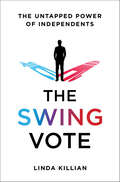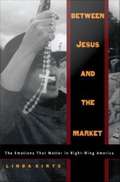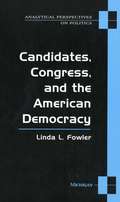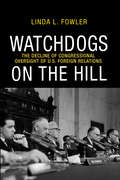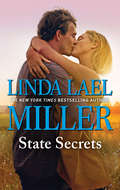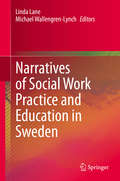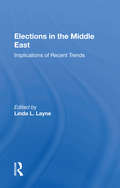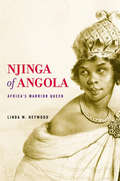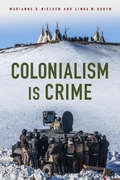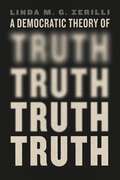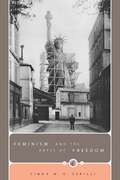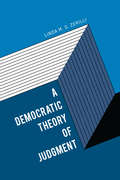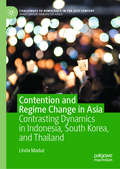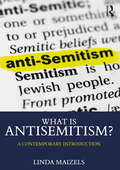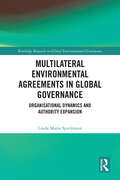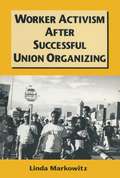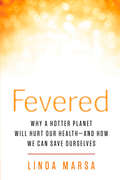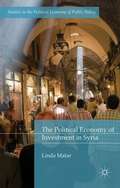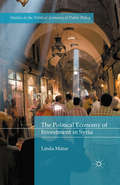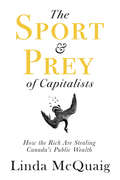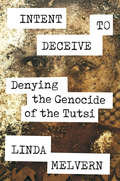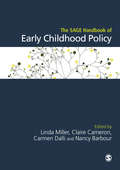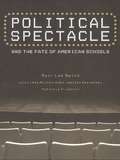- Table View
- List View
The Swing Vote: The Untapped Power of Independents
by Linda KillianAs our country's politicians engage in bitter partisan battles, focused on protecting their own jobs but not on doing the nation's business, and political pundits shout louder and shriller to improve their ratings, it's no wonder that Americans have little faith in their government. But is America as divided as the politicians and talking heads would have us believe? Do half of Americans stand on the right and the other half on the left with a no-man's-land between them?Hardly. Forty percent of all American voters are Independents who occupy the ample political and ideological space in the center. These Americans are anything but divided, and they're being ignored. These Independents make up the largest voting bloc in the nation and have determined the outcome of every election since World War II. Every year their numbers grow, as does the unconscionable disconnect between them and the officials who are supposed to represent them.The Swing Vote: The Untapped Power of Independents tells the story of how our polarized political system is not only misrepresenting America but failing it. Linda Killian looks beyond the polls and the headlines and talks with the frustrated citizens who are raising the alarm about the acute bi-polarity, special interest-influence, and gridlock in Congress, asking why Obama's postpartisan presidency is anything but, and demanding realism, honest negotiation, and a sense of responsibility from their elected officials.Killian paints a vivid portrait of the swing voters around the country and presents a new model that reveals who they are and what they want from their government and elected officials. She also offers a way forward, including solutions for fixing our broken political system. This is not only a timely shot across the bows of both parties but an impassioned call to Independents to bring America back into balance.
Between Jesus and the Market: The Emotions that Matter in Right-Wing America
by Linda KintzBetween Jesus and the Market looks at the appeal of the Christian right-wing movement in contemporary American politics and culture. In her discussions of books and videotapes that are widely distributed by the Christian right but little known by mainstream Americans, Linda Kintz makes explicit the crucial need to understand the psychological makeup of born-again Christians as well as the sociopolitical dynamics involved in their cause. She focuses on the role of religious women in right-wing Christianity and asks, for example, why so many women are attracted to what is often seen as an antiwoman philosophy. The result, a telling analysis of the complexity and appeal of the "emotions that matter" to many Americans, highlights how these emotions now determine public policy in ways that are increasingly dangerous for those outside familiarity's circle. With texts from such organizations as the Christian Coalition, the Heritage Foundation, and Concerned Women for America, and writings by Elizabeth Dole, Newt Gingrich, Pat Robertson, and Rush Limbaugh, Kintz traces the usefulness of this activism for the secular claim that conservative political economy is, in fact, simply an expression of the deepest and most admirable elements of human nature itself. The discussion of Limbaugh shows how he draws on the skepticism of contemporary culture to create a sense of absolute truth within his own media performance--its truth guaranteed by the market. Kintz also describes how conservative interpretations of the Holy Scriptures, the U. S. Constitution, and the Declaration of Independence have been used to challenge causes such as feminism, women's reproductive rights, and gay and lesbian rights. In addition to critiquing the intellectual and political left for underestimating the power of right-wing grassroots organizing, corporate interests, and postmodern media sophistication, Between Jesus and the Market discusses the proliferation of militia groups, Christian entrepreneurship, and the explosive growth and "selling" of the Promise Keepers.
Candidates, Congress, and the American Democracy
by Linda L. FowlerDiscusses the effect of the process of candidate selection on democracy in the United States
Watchdogs on the Hill
by Linda L. FowlerAn essential responsibility of the U.S. Congress is holding the president accountable for the conduct of foreign policy. In this in-depth look at formal oversight hearings by the Senate Armed Services and Foreign Relations committees, Linda Fowler evaluates how the legislature's most visible and important watchdogs performed from the mid-twentieth century to the present. She finds a noticeable reduction in public and secret hearings since the mid-1990s and establishes that American foreign policy frequently violated basic conditions for democratic accountability. Committee scrutiny of the wars in Iraq and Afghanistan, she notes, fell below levels of oversight in prior major conflicts.Fowler attributes the drop in watchdog activity to growing disinterest among senators in committee work, biases among members who join the Armed Services and Foreign Relations committees, and motives that shield presidents, particularly Republicans, from public inquiry. Her detailed case studies of the Truman Doctrine, Vietnam War, Panama Canal Treaty, humanitarian mission in Somalia, and Iraq War illustrate the importance of oversight in generating the information citizens need to judge the president's national security policies. She argues for a reassessment of congressional war powers and proposes reforms to encourage Senate watchdogs to improve public deliberation about decisions of war and peace.Watchdogs on the Hill investigates America's national security oversight and its critical place in the review of congressional and presidential powers in foreign policy.
State Secrets
by Linda Lael MillerShe's about to become a lot more than just an assignment to this undercover secret agent… don't miss this reader favorite from #1 New York Times bestselling author Linda Lael Miller! Cookbook author Holly Llewellyn is the last person who should be labeled an “enemy of the state”—or is she? After all, her brother is a missing traitor, and with her ties to the president, the Secret Service isn't taking chances. So they send in agent David Goddard, undercover. But after one glance, David knows Holly isn't just an “assignment”—she's a woman who'll change his life. But first, he'll have to keep her safe from the enemy that will remain hidden at all costs until they can strike… Originally published in 1985
Narratives of Social Work Practice and Education in Sweden
by Linda Lane Michael Wallengren-LynchThis book brings a novel approach to issues of connecting social work practice to theory and the personal life narrative. The authors each find their own unique way of integrating the self, theory, and practice, in different social work practice and education settings. Contributors use the methodology of narrative to tell their story about their social work journey, be that in research, teaching, or practice. The backdrop for this book is Sweden. The country’s rich heritage of welfare provision but also recent cultural diversity offers a unique Nordic context to the subject matter. The contributors engage with these new conditions for Swedish social work through an intersectional lens. Topics explored include: Digging in the present: A day in the life of a school counsellorWe live in a political world: Between needs and moneyThe problematic labour market situation of immigrants to Sweden: Consequences and causesTackling the contradictory nature of social workUsing anti-oppressive practice to promote social inclusion in social work education The result is a book that is personal and reflexive, and positions the contributors' narratives as a window to understand and address social problems.Narratives of Social Work Practice and Education in Sweden should engage those interested in the Swedish welfare state, and who want to learn about how social work is taught and practised in this country. Intended to be a general introduction, the book provides guidance to those considering working in the field and for those newly qualified. It also provides examples for students of social work to connect personal narratives to social work settings.
Elections In The Middle East: Implications Of Recent Trends
by Linda LayneThe far-reaching impact of the latest parliamentary elections in the Middle East is examined in this volume. After an introduction that analyses the trends illustrated by the elections and their implications for regional stability, the book discusses recent elections in Turkey, Egypt, Israel, Jordan, and Kuwait. Individual chapters analyze the influence of pre-1980 patterns in the party system and voting on Turkey's 1983 election; the balloting in Egypt's 1984 election as a turning point toward democratization in contemporary Egyptian politics; the significance of Israel's 1984 election in view of the relatively small differences in objectives between Israel's right-wing Likud and the centrist Labor party; the role of traditional tribal influences and new political factions in Jordan's 1984 elections; and the influence of newly emerging social groups in Kuwait's 1985 election. The contributors discuss differences in party programs and platforms, the extent of control by elites, and the relevance of the elections to crucial economic and social problems and political stability
Njinga of Angola: Africa's Warrior Queen
by Linda M. HeywoodOne of history’s most multifaceted rulers but little known in the West, Queen Njinga rivaled Elizabeth I and Catherine the Great in political cunning and military prowess. Today, she is revered in Angola as a heroine and honored in folk religions. Her complex legacy forms a crucial part of the collective memory of the Afro-Atlantic world.
Colonialism Is Crime (Critical Issues in Crime and Society)
by Marianne Nielsen Linda M. RobynThere is powerful evidence that the colonization of Indigenous people was and is a crime, and that that crime is on-going. Achieving historical colonial goals often meant committing acts that were criminal even at the time. The consequences of this oppression and criminal victimization is perhaps the critical factor explaining why Indigenous people today are overrepresented as victims and offenders in the settler colonist criminal justice systems. This book presents an analysis of the relationship between these colonial crimes and their continuing criminal and social consequences that exist today. The authors focus primarily on countries colonized by Britain, especially the United States. Social harm theory, human rights covenants, and law are used to explain the criminal aspects of the historical laws and their continued effects. The final chapter looks at the responsibilities of settler-colonists in ameliorating these harms and the actions currently being taken by Indigenous people themselves.
A Democratic Theory of Truth
by Linda M. ZerilliA critique of the concept of truth presupposed by the post-truth debate—and a bold new vision for a more pluralistic citizenry. We say that we live in a “post-truth” era because disinformation threatens our confidence in the existence of a shared public world. Affirming objective truth may, therefore, seem necessary to save democracy. According to political theorist Linda M. G. Zerilli, such affirmation can stifle political debate and silence dissent. In fact, Zerilli argues that the unqualified insistence on objective truth is as dangerous for democracy as denying it. Drawing on Arendt, Foucault, and Wittgenstein, A Democratic Theory of Truth challenges the concept of truth presupposed by the post-truth debate. It argues that we, the people, have an essential role in discovering and evaluating any truth relevant to the political realm. The result is a striking defense of plurality, dissent, and opinion in contemporary democratic societies.
Feminism and the Abyss of Freedom
by Linda M. ZerilliIn contemporary feminist theory, the problem of feminine subjectivity persistently appears and reappears as the site that grounds all discussion of feminism. In Feminism and the Abyss of Freedom, Linda M. G. Zerilli argues that the persistence of this subject-centered frame severely limits feminists' capacity to think imaginatively about the central problem of feminist theory and practice: a politics concerned with freedom. Offering both a discussion of feminism in its postmodern context and a critique of contemporary theory, Zerilli here challenges feminists to move away from a theory-based approach, which focuses on securing or contesting "women" as an analytic category of feminism, to one rooted in political action and judgment. She revisits the democratic problem of exclusion from participation in common affairs and elaborates a freedom-centered feminism as the political practice of beginning anew, world-building, and judging. In a series of case studies, Zerilli draws on the political thought of Hannah Arendt to articulate a nonsovereign conception of political freedom and to explore a variety of feminist understandings of freedom in the twentieth century, including ones proposed by Judith Butler, Monique Wittig, and the Milan Women's Bookstore Collective. In so doing, Zerilli hopes to retrieve what Arendt called feminism's lost treasure: the original and radical claim to political freedom.
A Democratic Theory of Judgment
by Linda M.G. ZerilliIn this sweeping look at political and philosophical history, Linda M. G. Zerilli unpacks the tightly woven core of Hannah Arendt’s unfinished work on a tenacious modern problem: how to judge critically in the wake of the collapse of inherited criteria of judgment. Engaging a remarkable breadth of thinkers, including Ludwig Wittgenstein, Leo Strauss, Immanuel Kant, Frederick Douglass, John Rawls, Jürgen Habermas, Martha Nussbaum, and many others, Zerilli clears a hopeful path between an untenable universalism and a cultural relativism that forever defers the possibility of judging at all. Zerilli deftly outlines the limitations of existing debates, both those that concern themselves with the impossibility of judging across cultures and those that try to find transcendental, rational values to anchor judgment. Looking at Kant through the lens of Arendt, Zerilli develops the notion of a public conception of truth, and from there she explores relativism, historicism, and universalism as they shape feminist approaches to judgment. Following Arendt even further, Zerilli arrives at a hopeful new pathway—seeing the collapse of philosophical criteria for judgment not as a problem but a way to practice judgment anew as a world-building activity of democratic citizens. The result is an astonishing theoretical argument that travels through—and goes beyond—some of the most important political thought of the modern period.
Contention and Regime Change in Asia: Contrasting Dynamics in Indonesia, South Korea, and Thailand (Challenges to Democracy in the 21st Century)
by Linda MaduzIn undemocratic settings, where modes of political participation and interest mediation are severely limited, protest may become a major form of political action. When and why does popular upsurge occur in such a setting? What form does it take and what do people ask for? When does protest become regime-threatening? And how does the authoritarian government react? This book explains the dynamics we observe during regime change facing high contention, in which much is at stake both for those in power and their challengers. Focussing on the experiences of democratizing countries in Asia, the author shows that even in the chaotic context of regime change there are regularities in when and how people mobilize. The book applies concepts and methods used in social movement research to the study of regime change and is based on a newly collected protest event dataset of 20 years for Indonesia, South Korea, and Thailand.
What is Antisemitism?: A Contemporary Introduction (What is this thing called Religion?)
by Linda MaizelsIn October 2018, a white supremacist murdered eleven Jewish worshipers and wounded six others at the Tree of Life Synagogue in Pittsburgh, Pennsylvania, the deadliest attack on Jews ever perpetrated in the United States. The gunman’s motivation to kill Jews stemmed from his belief that Jews were committing "genocide" against white Americans. Although his animosity was motivated by a racial conception of Jews, the attack took place in a house of worship, illustrating the complex and interlocking web of anti-Jewish hatred based on race, ethnicity, nationality, religion, economic issues, and conspiracy theory that is commonly referred to as "antisemitism." What is Antisemitism? provides a detailed overview of this complex topic. It offers a history of anti-Jewish animosity from antiquity to the present; a discussion of the difficulties of defining antisemitism - arguably one of the most contentious issues in the contemporary discourse on the subject – and three case studies illustrating the diverse and wide-ranging nature of the phenomenon in the present-day, including examples from the political far right, the political hard left, and radical Islamism. With suggestions for further reading, and a chronological structure, this volume is an accessible and essential student textbook.
Multilateral Environmental Agreements in Global Governance: Organisational Dynamics and Authority Expansion (Routledge Research in Global Environmental Governance)
by Linda Maria SpielmannThis book proposes a conceptualisation of Multilateral Environmental Agreements as a form of International Organisations, exploring the ways in which they have expanded over time by discussing the nuances of authority in global governance.Multilateral Environmental Agreements are the key type of cooperation between states to address environmental concerns globally. While their activities regularly attract much attention from an academic and non-academic audience, their peculiar hybrid nature in-between treaties and full-fledged International Organisations, means they are often underestimated. This book proposes a new and innovative conceptualisation of Multilateral Environmental Agreements as a specific type of International Organisation which allows for a more accurate understanding of their dynamic nature, and uncovers expansive tendencies which have so far gone almost completely unnoticed. Based on a modern understanding of authority in global governance, the book shows how Multilateral Environmental Agreements represent a separate entity, and expand beyond the boundaries originally set by their member states. The book draws upon the neo-functionalist concept of spillover, as well as multiple other theoretical frameworks, to identify the two main drivers of expansion in Multilateral Environmental Agreements. To illustrate these drivers, the empirical chapters conduct six structured case studies, analysing specific cases of authority expansion in ozone and climate protection, including the Green Climate Fund under the UN Framework Convention on Climate Change. Overall, this book offers an invaluable contribution to the theoretical discussion on informal types of organisations, and provides new and extensive empirical insights into unexpected past and recent developments in global environmental governance.As such, this book will be of great interest to students and scholars of International Relations and International Law who focus on informal types of cooperation and legislation, dynamic institutional development, and international environmental politics generally.
Worker Activism After Successful Union Organizing
by Linda MarkowitzShows how different levels of worker participation during a union organizing campaign influence the perceptions and actions of those same workers after the campaign ends, and, thereby, the long-term effectiveness and success of the organizing effort. Drawing on historical and current examples, the author analyzes the political and economic contexts within which today's unions are organizing, including a detailed examination of the impact of the Wagner Act.
Fevered: Why a Hotter Planet Will Hurt Our Health -- and how we can save ourselves
by Linda MarsaBeyond images of emaciated polar bears and drought-cracked lakes, there remains a major part of climate change's impact that the media has neglected: how our health will suffer from higher temperatures and extreme weather. From spiraling rates of asthma and allergies and spikes in heatstroke-related deaths to swarms of invasive insects carrying diseases like dengue or West Nile and increases in heart and lung disease and cancer, the effect of rising temperatures on human health will be far-reaching, and is more imminent than we think.In Fevered, award-winning journalist Linda Marsa blends compelling narrative with cutting-edge science to explore the changes in Earth's increasingly fragile support system and provide a blueprint—a "medical Manhattan Project"—detailing what we need to do to protect ourselves from this imminent medical meltdown. In the tradition of Rachel Carson's Silent Spring, Marsa sounds the alarm on a subject that has largely been ignored by governments and policy makers, and persuasively argues why preparedness for the health effects of climate change is the most critical issue affecting our survival in the coming century.
The Political Economy of Investment in Syria (Studies In The Political Economy Of Public Policy)
by Linda MatarThe Political Economy of Investment in Syria.
The Political Economy of Investment in Syria (Studies in the Political Economy of Public Policy)
by Linda MatarLinda Matar examines Syria's failure to promote employment-generating investment prior to the uprising. Tackling the thorny issue of the inapplicability of modern investment theory to a developing country, she situates the analysis of investment in Syria in its historical context and examines the socioeconomic structure and political preconditions that set the course of capital accumulation. Matar argues that the class in charge of development, which oversaw the allocation of resources during the Hafiz and Bashar Assad regimes, precipitated a crisis of capital accumulation. Difficult-to-access data and information compiled from fieldwork reveal how neoliberal reforms failed to build productive capacity and instead enriched a few through short-term speculative and mercantile ventures. Productive investment in Syria prior to the uprising lurched downward, and the key related socio-economic variables followed. These deteriorating conditions contributed to the social explosion in 2011. Exploring the poor quality and quantity of investment, this study probes how the cant of the free market served as a veneer behind which the institutional decisions distorted income distribution in a way that would inevitably lead to collapse.
The Sport and Prey of Capitalists: How the Rich Are Stealing Canada’s Public Wealth
by Linda McQuaigWhy are we selling off the impressive public enterprises we often battled as a nation to create? In the early 1900s, thousands of Canadians battled wealthy interests, winning control of Niagara Falls and creating a public power company. Another popular movement succeeded in creating Canada’s public broadcasting system to counter American dominance of the airwaves. And a Canadian doctor established a publicly owned laboratory that saved countless lives by producing affordable medications, contributing to medical breakthroughs and helping to eradicate smallpox throughout the world. But in recent decades, we have allowed our inspiring public enterprises to be privatized and our vital public programs downsized, leaving us increasingly dominated by the forces of private greed that rule the marketplace. In The Sport and Prey of Capitalists, Linda McQuaig challenges the dogma of privatization, which has defined our political era. She argues that now more than ever, as we grapple with climate change and income inequality, we need to expand, not shrink, our public sphere.
Intent to Deceive: Denying the Rwandan Genocide
by Linda MelvernA shocking exposé of genocide denialIt is twenty-five years since the 1994 genocide of the Tutsi of Rwanda when in the course of three terrible months more than 1 million people were murdered. In the intervening years a pernicious campaign has been waged by the perpetrators to deny this crime, with attempts to falsify history and blame the victims for their fate. Facts are reversed, fake news promulgated, and phoney science given credence. Intent to Deceive tells the story of this campaign of genocide denial from its origins with those who planned the massacres. With unprecedented access to government archives including in Rwanda Linda Melvern explains how, from the moment the killers seized the power of the state, they determined to distort reality of events. Disinformation was an integral part of their genocidal conspiracy. The génocidaires and their supporters continue to peddle falsehoods. These masters of deceit have found new and receptive audiences, have fooled gullible journalists and unwary academics. With their seemingly sound research methods, the Rwandan génocidaires continue to pose a threat, especially to those who might not be aware of the true nature of their crime. The book is a testament to the survivors who still live the horrors of the past. Denial causes them the gravest offence and ensures that the crime continues. This is a call for justice that remains perpetually delayed.
World Organizations United Nations
by Linda MelvernAn introduction to get readers to faraway countries and people, as each organization dedicates itself to issues such as poverty, pollution, human rights, and world peace.
The SAGE Handbook of Early Childhood Policy
by Linda Miller Professor Claire Cameron Professor Carmen Dalli Nancy BarbourRecent authoritative evidence suggests that an estimated 200 million children under five fail to achieve their developmental potential due to factors including poor health and nutrition and the lack of stable high quality care. A significant number of the world’s children today lack the basic rights to health, development and protection. In light of such statistics, early childhood services for young children have expanded around the world. The SAGE Handbook of Early Childhood Policy draws critical attention to policy in Early Childhood Education and Care (ECEC) its relationship to service provision and its impact on the lives of children and families. The perspectives of leading academics and researchers from Europe, North America, South America, Africa, Australasia and Asia have been arranged around five key themes: Part 1: The Relationship Between Research, Policy And Practice: Country Case Studies Part 2: Equitable Early Childhood Services: Intervention to Improve Children’s Life Chances Part 3: Extending Practice: The Role of Early Childhood Services In Family Support Part 4: Participation, Rights and Diversity Part 5: Future Directions for Early Childhood Policy This handbook is essential reading for practitioners, stakeholders and others committed to working within early years services to achieve an awareness of policy and its implications for services and practice.
The SAGE Handbook of Early Childhood Policy
by Linda Miller Professor Claire Cameron Professor Carmen Dalli Nancy BarbourRecent authoritative evidence suggests that an estimated 200 million children under five fail to achieve their developmental potential due to factors including poor health and nutrition and the lack of stable high quality care. A significant number of the world’s children today lack the basic rights to health, development and protection. In light of such statistics, early childhood services for young children have expanded around the world. The SAGE Handbook of Early Childhood Policy draws critical attention to policy in Early Childhood Education and Care (ECEC) its relationship to service provision and its impact on the lives of children and families. The perspectives of leading academics and researchers from Europe, North America, South America, Africa, Australasia and Asia have been arranged around five key themes: Part 1: The Relationship Between Research, Policy And Practice: Country Case Studies Part 2: Equitable Early Childhood Services: Intervention to Improve Children’s Life Chances Part 3: Extending Practice: The Role of Early Childhood Services In Family Support Part 4: Participation, Rights and Diversity Part 5: Future Directions for Early Childhood Policy This handbook is essential reading for practitioners, stakeholders and others committed to working within early years services to achieve an awareness of policy and its implications for services and practice.
Political Spectacle and the Fate of American Schools (Critical Social Thought)
by Mary Lee Smith Linda Miller-Kahn Walter Heinecke Patricia F. JarvisThe authors argue that the most influential and well-known educational policy programs in the past 30 years are not based on democratic consensus, but are instead formulated by the political community as symbolic efforts meant to generate personal partisan gain.
